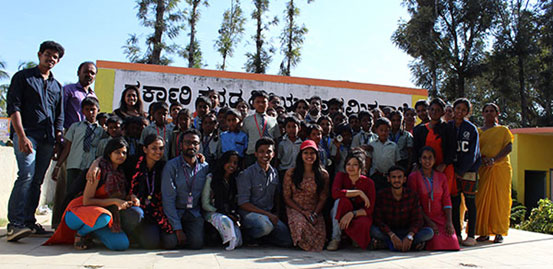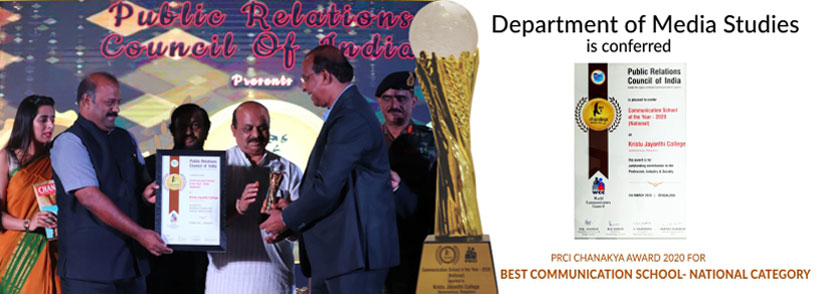
Rural Exposure
Rural Exposure Program-Clean Water and Sanitation (UNSDG-6) Theme- Ensure Safe Drinking Water
Date: 11 & 12 November 2024
The Department of Media Studies, Kristu Jayanti College (Autonomous), Bengaluru, organised a two-day campaign, on 11th and 12th of November by the name “Ensure Clean Water-”, as part of rural exposure. The campaign was conducted in Kaiwara Village, Chikkaballapura District in Governments schools with a focus on student empowerment and rural analysis.
To raise awareness of clean water and sanitation for safe drinking water in the hamlet, the students organised a number of programs.
The availability of water facilities, hygiene, and sanitation management were examined using a survey. The poll also included an analysis of how the rural population was exposed to media channels for knowledge and awareness in the digital age. By participating in various recreational and curricular activities, such as water management, sanitation, and hygiene practices, high school students in the communities gained confidence. In order to raise awareness regarding the presence of fluoride contamination in the drinking water, the success of the Water Awareness campaign in Kaiwara village was also evaluated.

Rural Exposure - Good Health And Well Being (UNSDG-3)
Date: 25 & 26 October 2023
The Department of Media Studies (PG) of Kristu Jayanti College (Autonomous), Bengaluru, organized a two-day campaign, on the 25th and 26th of October by the name “Ensure Healthy Life”, as part of rural exposure. The campaign was conducted in Kaiwara Village, Chikkaballapura District in government schools with a focus on student empowerment and rural analysis. The students conducted numerous programs to create awareness of health-related aspects and utilization of safe drinking water in the village.
A survey was conducted to analyze the availability of health facilities and emergency medical services. The exposure of the rural population to media platforms in the digital age for information and awareness was also analyzed as part of the survey. High school children in the villages were educated by conducting different curricular and extracurricular activities like Waste management, of Biodegradable, Non-biodegradable, and Hazardous Waste Management. The effectiveness of the Water Awareness drive in the Kaiwara village was also measured to provide knowledge about Floride Contamination in the drinking water.
Maternal and Infant Care awareness in village households was also a part of the campaign. Students collected information related to maternal health issues from the villagers. As a result, an awareness of the problems associated with maternal and infant health issues was created. The campaign was conducted to create awareness of Rural life and the challenges faced by the rural people. The media students were able to initiate development programs in the village successfully. A variety of programs, including social and experimental design, were organized for the children, to engage with the mainstream issues. Dr Ravi Kumar P and Ms. Sai Prathvi, faculties of Media Studies (PG) coordinated the two-day campaign.
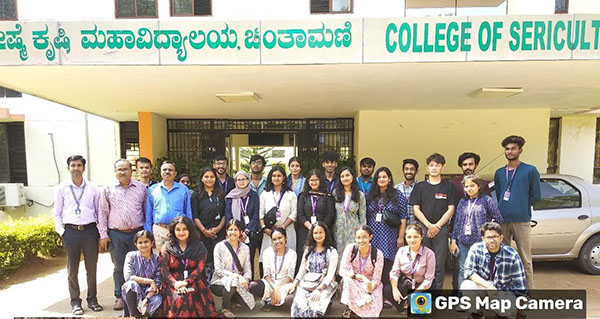
Two Day Campaign in Commemoration of UN SDG 6: Clean Water and Sanitation
Date: 17 & 18 November 2022
The Department of Media Studies PG, Kristu Jayanti College organized a Two-Day Rural Exposure Visit to Kaiwara Village in Chintamani Taluk of Chikkaballapura District in Karnataka on 17 & 18 November,2022, providing an opportunity to the students to gain hands on experience and practical skills while being exposed to rural areas. The commemoration of SDG -6 took place as the students carried out a Two-day Clean Water and Sanitation Campaign with the purpose of ‘Making the invisible visible’. 13 students were accompanied by 2 faculty members who together explored various areas of the Kaiwara village. A Two-day itinerary was planned out which was executed once the Jayantians reached the Sri Yogi Narayana Mutt, where their food and accommodation was taken care of.
The first day started off with an interaction with the PRO of the Mutt Mr. T L Anand, who gave a detailed historical significance of Kaiwara and the mutt that we were staying at. After the interaction, the Jayantians visited the Government High School, Kaiwara. Here the batch of only 13 students were divided into three groups where each group was assigned a particular topic and activity to carry out. Keeping the campaign and purpose of the visit, the students carried an awareness campaign on clean water, hygiene and sanitation which included a skit. While one team performed the skit while the other two teams engaged the students with sustainable art and craft activity and exercises on English grammar. Soon after this, the students went into different village areas on the basis of their teams and interacted with the villagers while carrying out a survey that was required for their field of study.
The second day was concentrated on visiting places of significance which included a trek up the Kaiwara Hill, Narasimha Swamy Temple, Antargange Hills and Caves and not to forget the visit to College of Sericulture, Chintamani. Two professors of the College were allotted as guides who walked the students through the whole process of how silk is harvested and made into silk sarees. From the plantations to worms forming the cocoons, to weaving of the silk in the machines was all shown step by step. Through this, the students acquired knowledge on the types of silkworms and the type of silk they produce and much more. One of the most interesting parts of this tour was to see how each and every single thing was made use of- for instance, dry cocoons were made into beautiful crafts such as Ganesha idol, flowers, jewellery etc.
This trip was not only informative but it also proved to be a much-needed break from the monotonous routine that the students had. It gave them a chance to engage in learning outside their classroom. The survey they carried out impacted their research and analytical skills. Such trips definitely become a part of the core memory that the Jayantians would carry along even after their college life.
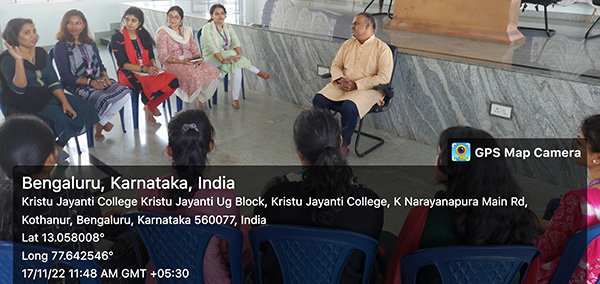
Two Day Campaign in Commemoration of UN Day
Date: 22/10/2021 and 23/10/2021
In commemoration of the United Nations Day, the Department of Media Studies (PG) of Kristu Jayanti College (Autonomous), Bengaluru, organised a two-day campaign, “Make a Difference: Be the Difference”, as part of rural exposure. The campaign was conducted in Kannamangala, Purushanahalli, and Kanaswadi Governments schools with a focus on student empowerment and rural analysis. To reduce the inequalities and to measure the digital divide in the village, numerous programs were conducted by the students.
A survey was conducted to analyse the impact of Covid-19 in the village and their difficulties to encounter the pandemics. The exposure of the rural population to media platforms in a digital age for information and awareness was also analysed as part of the survey. One hundred fifty school children in the villages were empowered by conducting different curricular and extracurricular activities. The effectiveness of the vaccination drive in the villages was also measured to understand the efficiency of vaccination campaigns.
A green awareness drive at the village households was also a part of the campaign. Five hundred saplings were planted in the village in the campaign days, and 55 saplings were distributed to the children in schools to nurture for the future. Two thousand masks, sanitisers, and Covid awareness leaflets were also dispersed in the village to ensure safety during pandemics.
The campaign was conducted in partnership with Gujarat Tourism and WFV (Water for Voiceless). The media students were able to initiate development programs in the village successfully. A variety of programs, including cultural and experimental design, were organised for children to engage with the mainstream. Dr Juby Thomas, Faculty of Media Studies (PG), and Prof. Retheesh Palakkuzhyil, from the Department of Tourism, coordinated the two-day campaign.
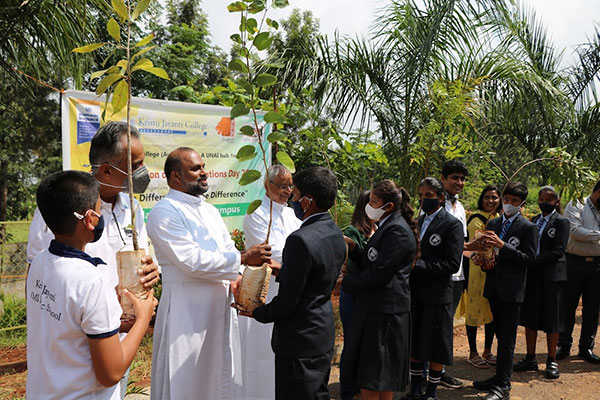
Journalism students explored the rural realms of India
On 26 August 2019, Department of Journalism and Mass Communication organized a rural exposure program for the postgraduate students. They visited Thindlu village in Devanahalli Taluk. Journalism students interacted with the students of Sri Krishna Vishalakshi Government high school where they taught the children from 8-10 standards. Communicative English, value education were taught to them. They organized pick up and speak competition where the children spoke on a particular topic. A group of 26 students along with their mentor Dr. Juby Thomas visited the households to identify the challenges of village life by having a conversation with approximately 100 residents in the village.
They spread awareness about health, sanitation and various government schemes with the locals, which served as a great experience in the lives of budding journalists. They also conducted several indoor and outdoor games for the children. As part of the clean drive, they even painted the benches and tables for the school children and decorated it with traditional Indian art forms. An individual interaction with students and the residents provided a multi perspective learning about the rural realms.
In order to understand the rural Indians dependency on various media platforms and modes of communication a survey was conducted. The results highlight the gender difference in media consumption, the dominance of cable television channels as a medium of communication, an absence of usage of radio as a source of information and accessibility of information through internet. The survey enabled the students understand the communication gap and necessity of media literacy.
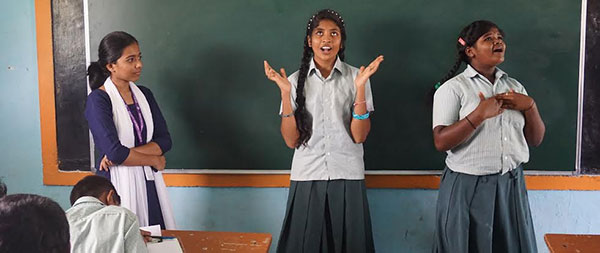
Rural exposure 2018
Department of Journalism and Mass Communication, Kristu Jayanti College, Bengaluru organized a rural exposure programme for the second semester MA JMC students in Kesaregere Village, Mallur district on December 17, 2018. The first part of the journey was to the Government Higher Primary School, Kesaregere. The school has 102 students.
Journalism students conducted parallel sessions on health and hygiene for the children. They also taught them basic communication skills and rhymes. A group of students were involved in painting the benches, desks and walls of the school and also helping in cooking for the children. Several indoor and outdoor games were organized. Outdoor games like musical chair, lemon and spoon race, throw ball and kabaddi were organized for the children.
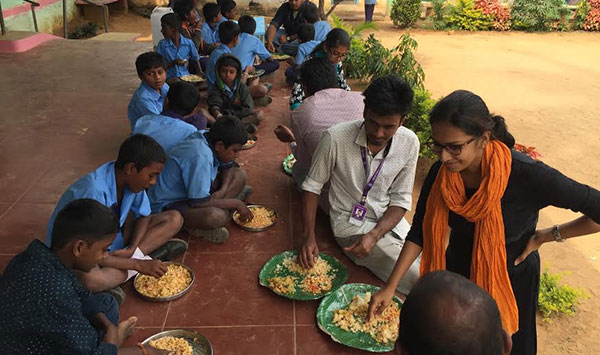
Rural exposure 2017
The department of Mass communication and Journalism organized a rural exposure program for the first and second year postgraduate students on 27 February 2018. Students visited Byalahalli, a village located at Kolar District.
The day began with a formal session with the teachers and the students in the government school. Drawing, craft and sports competitions were conducted for the students in the school. Journalism students made all possible ways to create awareness on various safety tips and conducted sessions on spoken English and ethical values.
At 2.00 PM students went for the village visit. They visited around 120 houses and conducted a media exposure study and submitted the report in the form development news. It was identified that most of the households own a television set and the majority of the women watch serials and movies. News consumption was very less among the people and several women didn’t know the names of news channels. Out of the 120 households only three of them had a radio sets and mobile penetration among the youth have increased drastically.
At 4:00 PM the participants gathered in the school for a valedictory ceremony and Prof. Juby Thomas distributed the prizes to the winners.
